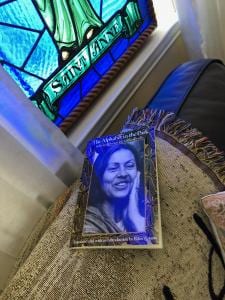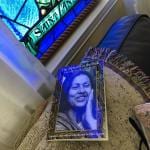Pandemic times spawn tyrants, little dictators offering security in exchange for our liberty or the life of “someone else.” We are worried so they offer us a golden calf as a savior and if we are not very careful, then we hide our fears in the play, bread and circuses, they offer. Plato and Adelia Prado know tyranny from the inside and are a good vaccine to that virus. Plato does so by exposing us to a story of tyranny to inoculate us. Prado urges social distance, as much as allowed, by giving us images or a language that exposes the lies of the tyrants.
Some Other Names of Poetry
I’d like an abandoned city
So I could find things in the houses,
Iron objects,
A fascinating picture on the wall
Forgotten in the rush.
But without a visible war and with life so expensive,
Who leaves behind so much as a needle?
The only place I will find things
Is in the rich cellar of dreams,
Things I’ll never possess.
All my life I’ve resisted Plato, with his broad shoulders,
His crippled Republic where poets are exiled.
After all, errors in translation are rife,
And I don’t know Greek-
I never went through a sack of salt with him.
What he said or what I say
Is meat thrown to the wild beasts-
But not what we dream.
There are no lies in dreams,
Where everything is naked and where we’re unarmed.
Plato’s myth- maybe he wrote it against his will;
who knows?-
Is as I tell it:
There’s a hole in the corpse’s throat
Big as the valley of Jehoshaphat where we will be judged.
No power in the world picks a fight
When the subject is light and shadow,
The morning dew on a horse’s mane or snout.
But the legions of darkness get furious
And the coroner’s office (for suspicious reasons)
Hides the photograph of the alleged suicide.
While love, which they don’t believe in,
Goes on impassive, spawning just sentences,
Blessings, lovers-
In spite of the corpse
And its ruined neck.
 Prado is better at knowing Plato than most scholars of Plato.
Prado is better at knowing Plato than most scholars of Plato.
They have crippled Plato by reading his great work of story telling and myth making as if, somehow, they can ignore the very literary structure of the dialogue and still know just what Plato is saying. Republic is a dialogue between characters, but I have seen “scholarly” translations that ignore the responses of some characters, because they were unimportant!
Prado has avoided Plato, because of what she has been taught, but her instincts are better. She knows she does not know Plato, as a person, and also pauses over his myth making. Prado hints at a deeper truth regarding Plato.
Plato “bans” poets in a city in words that his character Socrates has no hope will ever be built.* As his young friends press for details, Socrates tries to show them justice while putting in details so absurd that nobody will take the image too seriously. The dialogue is a work of art and contains several deep myths, including a story about an invisibility ring from (almost) the start! Prado sees this and senses that if she could get to know Plato better that he would not ban all the poets!
Prado hates tyrants, because they “tell stories,” but not true ones, myths or folk tales. Instead, the tyrant simply lies: his victim is a suicide. The tyrant is not satisfied with the death of his enemies, but must make them sinners in a traditional Catholic culture: a suicide. The just city might tell stories to motivate excellence, noble tales, while the tyrant, out of fear and loathing, tells wicked lies.
Our dreams, not our fantasies or our fevered desires, but our dreams point to what should be. Plato pointed to justice with myths and tales, a dialectic that is unavoidable between the text and the reader. This is how he wrote. A tyrant posts lies and orders on the social media walls.
Prado knows, as all Christians know, that love endures the tyrants, because Love is beyond our cities, but infuses our civilization! Let’s guard our liberty, our sanity, or love by listening to the musician, the poet, the lover of wisdom.
No panic, poetry. No tyranny, just philosophy!
See my own When Athens met Jerusalem for what I think (so tentatively!) Plato is saying in Republic.












